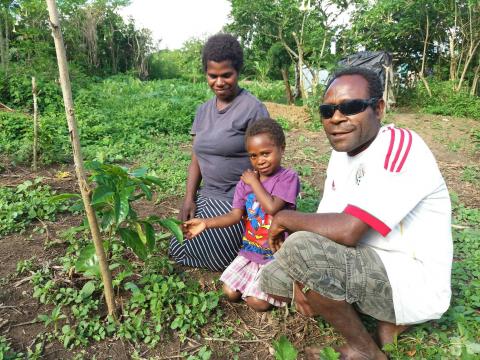A gift for a generation

Since the devastation of Cyclone Pam in 2015 and the impact of El Nino followed by La Nina, agricultural production for both commercial and consumption purposes has been a struggle for the largely subsistence farming population on Tanna Island in Vanuatu.
World Vision’s Agricultural Development for Tanna’s Economic Growth (ADTEG) is a project funded by the New Zealand government and AuCom and private donations from the New Zealand public which works with local coffee farmers to address this challenge and rebuild livelihoods. ADTEG establishes savings groups and trains community members in financial literacy, it helps community members to complete natural disaster awareness training and disaster mitigation plans. The project also trains small holder farmers in improved farming practices for marketable produce, which leads to improved crop quantity, quality and increased income.
World Vision distributed 55,000 coffee seedlings to over 650 farmers in 14 communities in Tanna from Tanasul village on the South West of Tanna to Tapkapen in the south, in collaboration with the Department of Agriculture, Tanna Coffee and Nasituan.
Nakou, a 36-year-old father of one said, “Where we live, coconut trees do not grow and for the last two generations, coffee trees have been our money tree. Cyclone Pam greatly affected our farms but I am delighted that our children have been presented with this gift that they can live off like we have. There is hope.”
Excited that he had been given seedlings, instead of trying to grow them himself at a time when vegetation was struggling, Nakou said, “My family gathered the 300 coffee seedlings that were given to us by the project and took them to the garden to plant. I shared with my child kids and wife that coffee plants for a Christmas and New Year’s gift is better than having plastic toys that will break and not last.
Along with coffee seedlings, 20 coffee pulper machines were also distributed to farmers.Pulper machines mechanically remove the skin and flesh from the coffee fruit, a task that is usually completed manually by women. Rose, one of the farmers who has access to a pulper machine shared her experience, “It used to take me hours to fill three sacks, I can now do that in about 15 minutes. My hands no longer ache from the damage done to my palms and fingers and I now have more time to look after my children and do other work in the garden and at home.”
With gratitude in his voice, Nakou shared, “I am so happy because not only do I know that the coffee harvest will assist with money for school fees and other needs, but coffee plants are easier to look after compared to other plants, especially with the equipment and new information World Vision has given us. ”
“It is exciting to see farmers acknowledge that the new information and tools we provide will really cut down costs and improve quality of production and improve their wellbeing and that of their families! We are all looking forward to the end-product,” said ADTEG development manager Isabel Petri.
In future the program will help farmers to establish a functional, sustainable system for farmers to engage with market actors and service providers.
The project, which works with 8,155 people in six communities in the south and south west of Tanna, also has a disaster risk reduction component and an income generating component and will run until 2020.